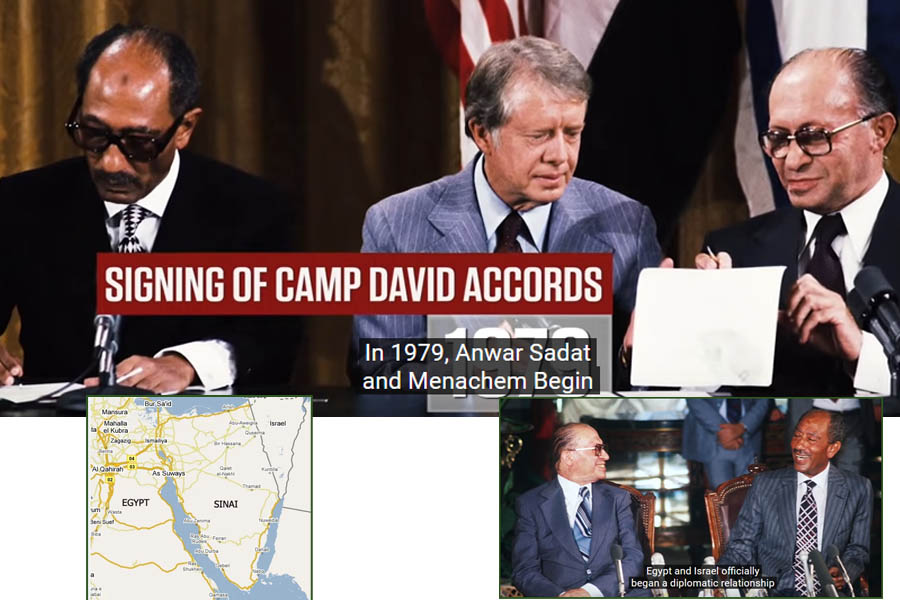
In the delicate geopolitical landscape of the Middle East, historical agreements often serve as the thin line between peace and conflict. The 1979 Camp David Peace Accords, a landmark agreement between Egypt and Israel, have long been hailed as a cornerstone of stability in the region. However, recent developments involving Israel's intentions in the border city of Rafah risk unraveling this fragile balance and plunging the region into turmoil.
Israeli Prime Minister Benjamin Netanyahu's announcement of a potential ground operation in Rafah, coupled with plans to evacuate civilians from the area, has drawn sharp criticism and raised concerns about the violation of the Camp David Accords. Rafah, situated on the Egypt-Gaza border, holds strategic significance and is home to a substantial Palestinian population. Any military incursion into this territory would not only disrupt the lives of civilians but also pose a direct challenge to the terms of the historic peace agreement.
At the heart of the matter lies the meticulous framework established by the Camp David Accords. Signed in 1979 under the auspices of U.S. President Jimmy Carter, the agreement marked a pivotal moment in Middle Eastern history, bringing an end to decades of hostility between Egypt and Israel. Central to the accords was the delineation of military zones along the Egypt-Israel border, aimed at preventing conflict and fostering peaceful coexistence.
The proposed Israeli operation in Rafah directly contravenes these established boundaries and threatens to undermine the fundamental principles of the Camp David Accords. The city falls within Restricted Zone, a region where the presence and activities of Israeli forces are strictly regulated. Any unilateral action by Israel in this zone, without the consent of Egyptian authorities, would constitute a breach of the peace treaty and escalate tensions in the region.
Moreover, the potential displacement of civilians from Rafah further complicates the situation. Egypt, as a signatory to the Camp David Accords, holds a vested interest in preserving the integrity of the agreement and safeguarding the rights of Palestinian inhabitants in border areas. Netanyahu's evacuation plan not only disregards these concerns but also risks exacerbating humanitarian crises and fueling resentment among affected populations.
The international community has responded swiftly to the escalating tensions, with leaders from France, the United States, and other nations condemning Israel's proposed actions. Calls for restraint and adherence to diplomatic channels have echoed across diplomatic corridors, emphasizing the imperative of upholding established agreements and preventing further destabilization in the Middle East.
In the face of mounting pressure, Israel must heed the warnings and reconsider its approach towards Rafah. Any unilateral military action carries grave consequences, not only for the prospects of peace with Egypt but also for the broader stability of the region. As custodians of the Camp David Accords, both Israel and Egypt bear a shared responsibility to uphold the principles of mutual respect, cooperation, and peaceful coexistence.
In the face of mounting pressure, Israel must heed the warnings and reconsider its approach towards Rafah. Any unilateral military action carries grave consequences, not only for the prospects of peace with Egypt but also for the broader stability of the region. As custodians of the Camp David Accords, both Israel and Egypt bear a shared responsibility to uphold the principles of mutual respect, cooperation, and peaceful coexistence.
The road ahead is fraught with challenges, but it also presents an opportunity for diplomatic engagement and dialogue. By reaffirming their commitment to the spirit of Camp David, Israel and Egypt can navigate through the current crisis and chart a course towards lasting peace and prosperity in the Middle East. Failure to do so risks unraveling decades of progress and plunging the region into a perilous abyss of uncertainty and conflict.
Message To The Readers:
Threat to Camp David Peace Accords: Israel's proposed ground operation in Rafah, along with plans to evacuate civilians, poses a significant threat to the 1979 Camp David Peace Accords. These accords, hailed as a milestone in Middle Eastern diplomacy, established crucial boundaries and regulations aimed at preventing conflict along the Egypt-Israel border.
Violation of Established Boundaries: Rafah falls within Restricted Zone of the Camp David Accords, where Israeli military presence is strictly regulated. Any unilateral action by Israel in this zone, without the consent of Egyptian authorities, would constitute a breach of the peace treaty and escalate tensions in the region. The proposed evacuation of civilians further complicates the situation and risks exacerbating humanitarian crises.
International Concern and Condemnation: The international community, including leaders from France, the United States, and other nations, has swiftly condemned Israel's proposed actions in Rafah. Calls for restraint and adherence to diplomatic channels have been echoed, emphasizing the imperative of upholding established agreements and preventing further destabilization in the Middle East.
Opportunity for Diplomatic Resolution: Despite the escalating tensions, there remains an opportunity for diplomatic engagement and dialogue. Both Israel and Egypt, as custodians of the Camp David Accords, bear a shared responsibility to uphold the principles of mutual respect, cooperation, and peaceful coexistence. By reaffirming their commitment to the spirit of Camp David, they can navigate through the current crisis and chart a course towards lasting peace and prosperity in the Middle East. Failure to do so risks undoing decades of progress and plunging the region into uncertainty and conflict.
Thank you for reading: globalpostheadline.com | If you want to advertise your Company, Events, Movies, Products, Hotels, Travel Packages Let us know